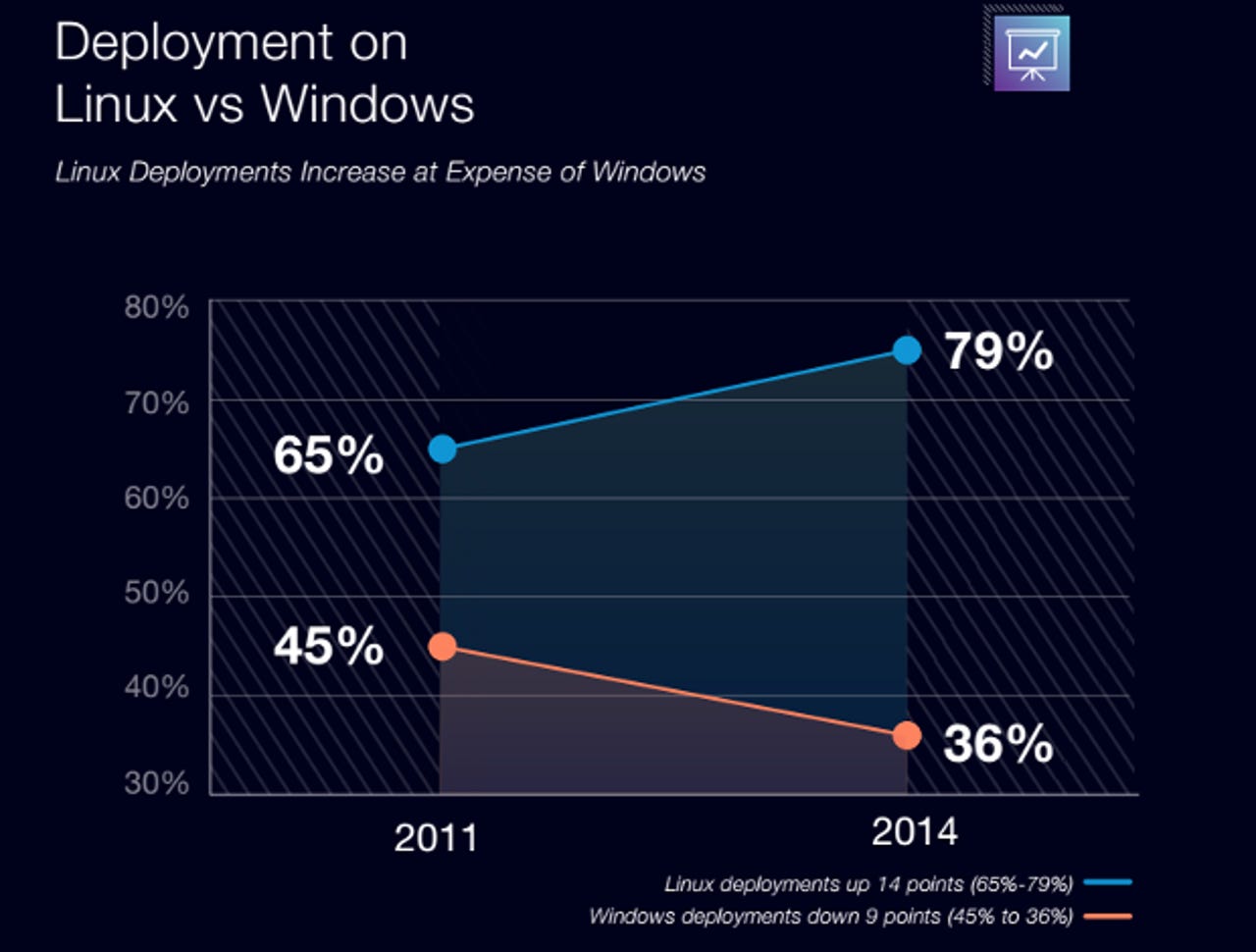Linux Foundation finds enterprise Linux growing at Windows' expense

Sure, Windows still rules the desktop, but Linux kicks rump and takes names on enterprise servers and the cloud, according to the 2014 Enterprise End User Trends Report from The Linux Foundation and the Yeoman Technology Group.

Specifically, they found that enterprise server applications are being deployed at the expense of Windows and Unix over the last four years. Linux application deployments have risen during this period, from 65 percent to 79 percent, while Windows deployment has fallen from 45 percent to 36 percent.
This report is based on data from an invitation-only survey of The Linux Foundation's Enterprise End User Council as well as companies and organizations with sales of $500 million or more, or 500 or more employees. The surveyed group included Morgan Stanley, Goldman Sachs, Bank of America, Bristol-Myers Squibb, NTT, Deutsche Bank, DreamWorks, ADP, Bank of New York, NYSE, NASDAQ, Goodrich, MetLife, and AIG. Of course, these companies are already invested in Linux. That said, it's noteworthy how many Fortune 500 and financial powerhouses now put their trust in Linux for mission-critical software.
Among the key findings from this year's report were:
Linux is leading the enterprise shift to cloud
Linux remains the go-to choice for the cloud, with 75 percent of enterprises reporting that they use Linux as their primary cloud platform. These numbers compare to fewer than 24 percent using Windows and less than 2 percent using Unix to support the cloud. Indeed, even Microsoft CEO Satya Nadella recently professed his love for Linux.
Enterprises consider Linux superior in technical prowess, security, and cost
In fact, 78 percent of enterprises feel that Linux is more secure than most other operating systems, an important consideration in light of increasing scrutiny on the security of projects that support the world's software infrastructure.
Linux continues its year-over-year growth — at the expense of other operating systems
Linux remains the platform of choice for enterprises running it; more than 87 percent added Linux servers this year, and 82 percent plan to add more in the next year. In fact, deployment on Linux has risen, while deployment on Windows continues to fall.
All this good news comes with a gray lining:
Rapid growth continues to raise concerns about finding Linux talent
The concern among the world's largest enterprises about finding trained Linux staff remains at just above 40 percent — and is the largest concern cited.
So, why, besides security, are top businesses moving to Linux? The survey found that the top three drivers for adopting Linux continue to be its feature set (74 percent), security (69 percent), and lower TCO (69 percent).
Simultaneously, the executive suite's view of Linux has remained consistently positive, with a steady 95 percent to 97 percent viewing the platform as equally or more strategic to the organization every year the survey has been conducted. Indeed, the foundation found that "one of the strongest trend lines in our surveys has been the growth in the use of Linux for mission-critical workloads relative to other operating systems. There has been a big uptick in this number, from a healthy 60 percent in our 2011 survey to 72 percent this year."
At the same time, the survey respondents reported "a sharp decline in the number of net new Windows, Unix, and "other" servers deployed in the last 12 months". Besides the drop of Windows servers, "Unix has dropped off by more than half — from 24 to 11 percent — over the same period."
Put it all together, and what do you get? Linux has continued to establish itself as the operating system of choice for enterprises in their server rooms, datacenters, and clouds.
Related stories: